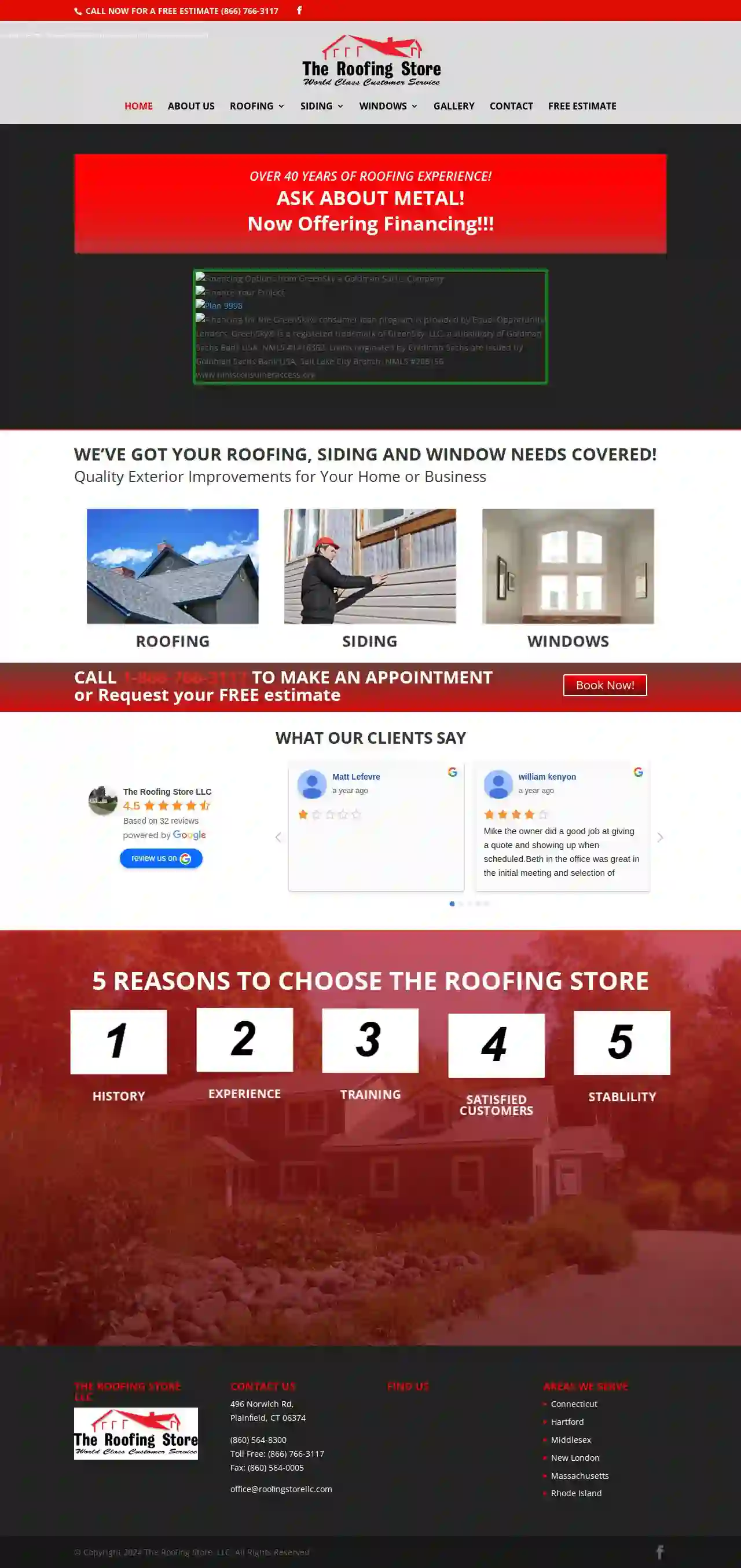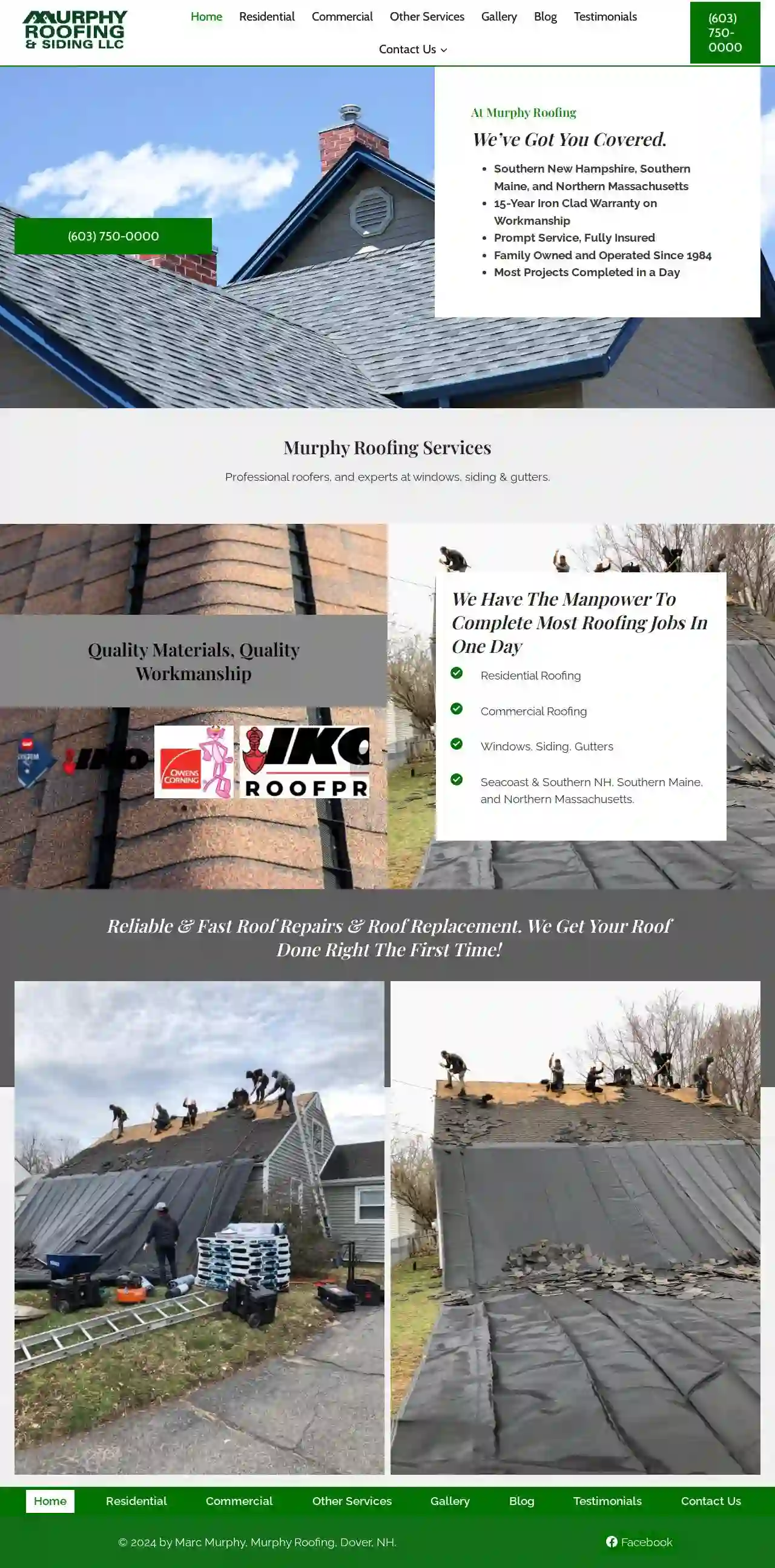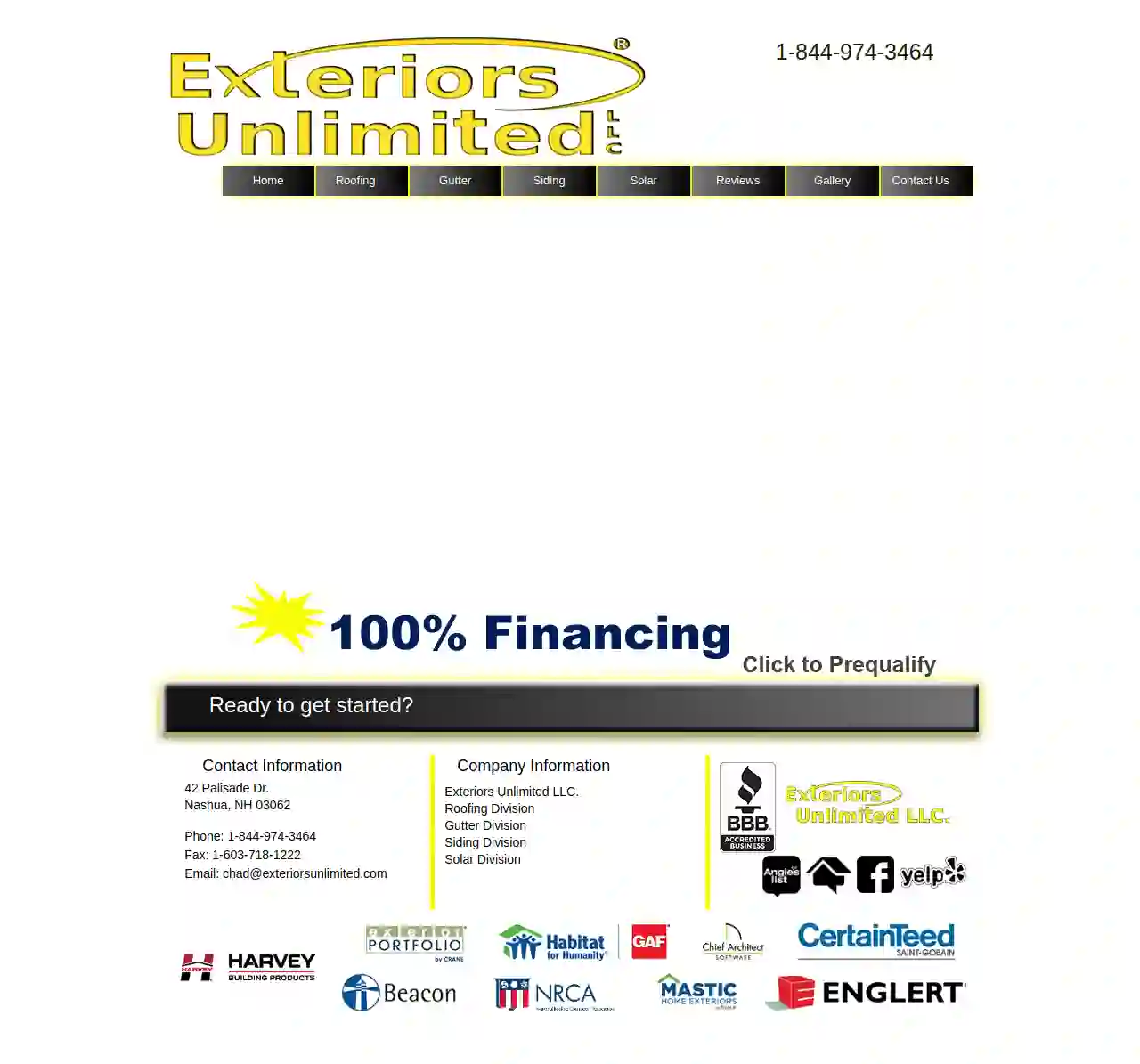Roofing Companies Essex Junction
Find the best Roofing Service in Essex Junction
Receive up to 3 Roofing Contractor quotes for your project today! Compare profiles, reviews, accreditations, portfolio, etc... and choose the best service.

The Roofing Store LLC
4.532 reviews496 Norwich Road, Plainfield, 06374, USThe Roofing Store LLC is a family-owned and operated business with over 40 years of experience in the roofing industry. They specialize in a variety of roofing types, including asphalt shingles, metal roofs, and more. The company is committed to providing quality exterior improvements for both residential and commercial clients. They offer a wide range of siding options, windows, and chimney services. The Roofing Store LLC is a CertainTeed Master Shingle certified installer and is dedicated to providing their customers with the best possible service and workmanship.
- Services
- Why Us?
- Accreditations
- Our Team
- Testimonials
- Gallery
Get Quote
Rodrick Roofing and Siding, LLC
59 reviewsThomaston, CT, 06787, USRodrick Roofing and Siding LLC is a residential and commercial roofing and home remodeling services provider. With 24/7 emergency service and FREE, no obligation quotes, you're in good hands with us. Call us today at 860-436-7098 to schedule a consultation.
- Services
- Why Us?
- Accreditations
- Gallery
Get Quote
Infinity Roofing LLC | Roofing CT
510 reviewsHartford, USInfinity Roofing Contractors has become one of the fastest-growing exterior renovation companies in our area, but we’re proud to say that we’ve done it without compromising on service, quality, or integrity. We know what you want and work hard to deliver an outstanding experience every step of the way. Our success has been built on a foundation of great customer service, and we’re proud to say that our team has the highest level of certifications available. We work hard to stand out from the crowd because we believe in results, not gimmicks.
- Services
- Why Us?
- Gallery
Get Quote
J.J. Landerman Roofing Company
4.9115 reviews102R Filley Street, Bloomfield, 06002, USJ.J. Landerman Roofing Company is a 3rd generation family business serving the State of Connecticut with quality commercial and residential roofing services since 1935. We pride ourselves on our professionalism, communication skills, and attention to detail. At J.J. Landerman Roofing Company, we do more than roofing—we build relationships through service.
- Services
- Why Us?
- Accreditations
- Our Team
- Gallery
Get Quote
Murphy Roofing & Siding LLC
4.946 reviewsManchester, USAt Murphy Roofing We’ve Got You Covered. Southern New Hampshire, Southern Maine, and Northern Massachusetts 15-Year Iron Clad Warranty on Workmanship Prompt Service, Fully Insured Family Owned and Operated Since 1984 Most Projects Completed in a Day Murphy Roofing Services Professional roofers, and experts at windows, siding & gutters. Quality Materials, Quality Workmanship dfsdfdsffdsfd We have the manpower to complete most roofing jobs in One Day Residential Roofing Commercial Roofing Windows, Siding, Gutters Seacoast & Southern NH, Southern Maine, and Northern Massachusetts. Reliable & Fast Roof Repairs & Roof Replacement. We Get Your Roof Done Right The First Time!
- Services
- Why Us?
- Gallery
Get Quote
Hoffman Audi of East Hartford
4.7East Hartford, CT, 700 Connecticut Boulevard, 06108, USHoffman Audi of East Hartford is a family-owned and operated dealership that has proudly served Greater Hartford since 1921. We're driven by trust and committed to providing an exceptional car-buying experience. Our extensive inventory of new and used Audi models, combined with our award-winning service and on-site insurance agency, make us the one-stop-shop for all your automotive needs. Whether you're looking for a luxurious new Audi or a reliable used vehicle, our team of experts will work with you to find the perfect fit. We also offer affordable auto financing solutions and a wide range of Audi parts and accessories. Visit us today and experience the Hoffman Audi difference!
- Services
- Why Us?
- Accreditations
- Our Team
- Gallery
Get Quote
Fiori Construction LLC
5143 reviewsLondonderry, NH, 26 Sparhawk Dr, 03053, USMichael Fiori Construction is a professional roofing contractor with over 20 years of experience in commercial and home remodeling. We use only the best brands and guarantee that we'll beat any competitor's written price estimate. Our work comes with a 10-year labor warranty for complete peace of mind. We specialize in new roofs and re-roofing jobs, as well as home construction and remodeling. We're a certified MasterElite roofer and do over 200 roofs per year. We're licensed in both Massachusetts and New Hampshire and hold an unrestricted construction license. We're also certified by OSHA, GAF, NAHB, National Association of the Remodelling Industry, National Home Improvement Council, and the National Roofing Contractors Association.
- Services
- Why Us?
- Accreditations
- Our Team
- Testimonials
- Gallery
Get Quote
Exteriors Unlimited LLC
527 reviews42 Palisade Dr., Nashua, 03062, USExteriors Unlimited LLC is a family business serving in New Hampshire and Massachusetts. We offer a wide range of exterior home improvement services, including roofing, solar, siding, and gutter services. We are committed to providing our customers with high-quality workmanship and exceptional customer service. Contact us today to learn more about our services and how we can help you improve your home.
- Services
- Why Us?
- Gallery
Get Quote
QNK Roofing Ct
59 reviews113 Stillwater Ave, Stamford, 06902, USQNK Roofing Company is a reliable roofing firm providing enduring roof repair and replacement services in Greenwich. Fully Licensed & Insured with 25 years of experience and a 100% Satisfaction Guarantee. We go above and beyond to guarantee the safety and security of your project. We're excited to announce our outstanding 5/5 rating from the local community in Greenwich. At QNK Roofing, our dedication extends beyond roof repairs in Greenwich – we offer tailored solutions to meet all your roofing requirements. We boast being a reliable partner, addressing roofing concerns with precision, transparency, and a customer-centric approach. Opt for QNK Roofing for a dependable, committed, and comprehensive roofing experience.
- Services
- Why Us?
- Our Team
- Testimonials
- Gallery
Get Quote
Albana Roofing
4.753 reviewsHartford, USAlbana Roofing is the #1 Connecticut Roofing Company. We take pride in having served homeowners of Connecticut for 30 years. During that time we’ve completed thousands of roof repair and replacement projects, with thousands of happy customers to match. We are so grateful for all the loyal customers we’ve built up over the years. We wouldn’t have made it this far without you! We’re also excited about the new relationships with continue to build with new customers. Unlike some Hartford roofing contractors, our team has decades of combined experience in roofing, meaning we’ve dealt with every kind of roofing problem, and we always know the right solution.
- Services
- Why Us?
- Gallery
Get Quote
Over 17,196+ Roofers in our network
Our roofing contractors operate in Essex Junction & surroundings!
Roofyng.com has curated and vetted the Best Roofers arround Essex Junction. Find a top & reliable business today.
Frequently Asked Questions About Roofing Companies
- Age: If your roof is nearing or exceeding its expected lifespan, it's wise to consider replacement.
- Multiple Leaks: Several leaks or leaks that reappear after repairs suggest a widespread problem.
- Extensive Damage: Large areas of damaged, missing, or deteriorated roofing materials might be too costly or difficult to repair effectively.
- Sagging or Structural Issues: Sagging, deflection, or other structural issues indicate a compromised roof that needs replacement.
- Granule Loss (Asphalt Shingles): Significant granule loss indicates weathering and reduced protection.
- Curling or Buckling Shingles: Signifies age or improper ventilation.
- Increased Energy Bills: A poorly insulated roof can lead to higher heating and cooling costs.
- Listed Buildings: Buildings with historical or architectural significance.
- Conservation Areas: Areas with special architectural or historical character.
- Changes to Roof Design: If you're making significant alterations to the roof's design, such as adding a dormer window or changing the pitch.
- Safety First: Avoid going onto the roof during a storm, as it's dangerous.
- Document the Damage: Take photos and videos of the damage for insurance purposes.
- Contact Your Insurance Company: Report the damage to your insurance company as soon as possible to initiate a claim.
- Temporary Repairs: If safe, address any immediate leaks using buckets or tarps to minimize further damage.
- Contact a Roofing Contractor: After the storm, have a qualified roofing contractor inspect the roof and provide a repair estimate.
How often should I clean my gutters?
What are the signs that my roof needs to be replaced?
Do I need planning permission to replace my roof in the USA?
What should I do if my roof is damaged in a storm?
How often should I clean my gutters?
What are the signs that my roof needs to be replaced?
- Age: If your roof is nearing or exceeding its expected lifespan, it's wise to consider replacement.
- Multiple Leaks: Several leaks or leaks that reappear after repairs suggest a widespread problem.
- Extensive Damage: Large areas of damaged, missing, or deteriorated roofing materials might be too costly or difficult to repair effectively.
- Sagging or Structural Issues: Sagging, deflection, or other structural issues indicate a compromised roof that needs replacement.
- Granule Loss (Asphalt Shingles): Significant granule loss indicates weathering and reduced protection.
- Curling or Buckling Shingles: Signifies age or improper ventilation.
- Increased Energy Bills: A poorly insulated roof can lead to higher heating and cooling costs.
Do I need planning permission to replace my roof in the USA?
- Listed Buildings: Buildings with historical or architectural significance.
- Conservation Areas: Areas with special architectural or historical character.
- Changes to Roof Design: If you're making significant alterations to the roof's design, such as adding a dormer window or changing the pitch.
What should I do if my roof is damaged in a storm?
- Safety First: Avoid going onto the roof during a storm, as it's dangerous.
- Document the Damage: Take photos and videos of the damage for insurance purposes.
- Contact Your Insurance Company: Report the damage to your insurance company as soon as possible to initiate a claim.
- Temporary Repairs: If safe, address any immediate leaks using buckets or tarps to minimize further damage.
- Contact a Roofing Contractor: After the storm, have a qualified roofing contractor inspect the roof and provide a repair estimate.